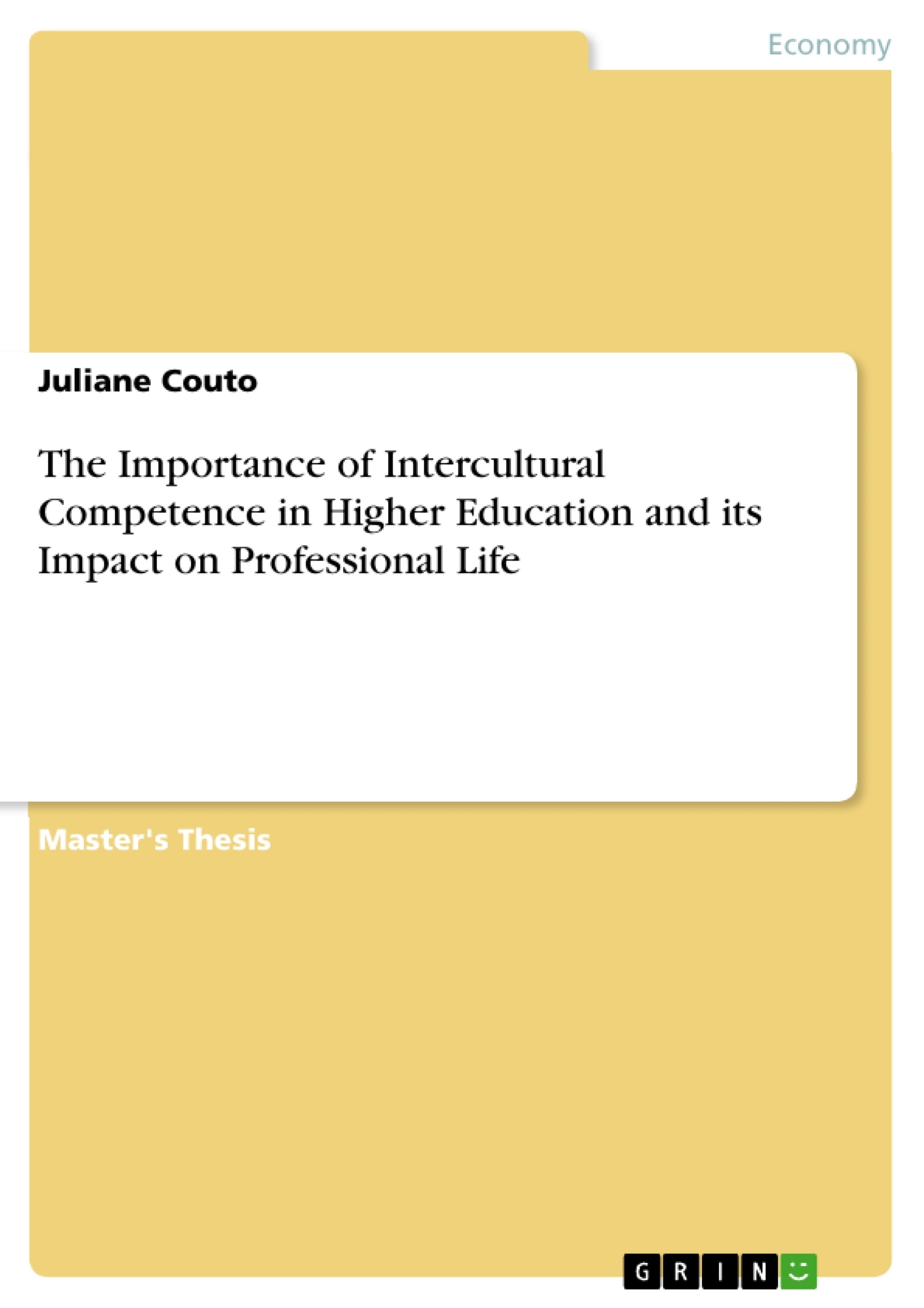On the basis of a growing international interconnection that has led to an increasing number of culturally diverse teams, study and working environments, as well as significant changes in the intercultural orientation aimed at adapting to the realities of a
multicultural society, the object of this thesis is to expound the significance of intercultural competence in the field of higher education, to illustrate challenges stemming from an intercultural cooperation and to cover feasible improvement opportunities of dealing with them.
In order to be interculturally competent, certain character traits emerge as very important. Also certain soft skills, especially the ones related to the social competence were identified as crucial. Learning those is, as a matter of course, a lifelong process, however influenced by individual experiences and the external environment. Higher Education Institution belong to the external environment that plays a significant role in developing, or, at least promoting ways for intercultural competence. Recently, the role of higher education in this context has been explored in great detail.
Based upon a solid theoretical literature review and an empirical research in form of a case study, the research concluded that IC promoted at HEI has only a theoretical and initial impact on professional life. To paraphrase it differently, HEI has the function to lay the fundamental ground in learning to become intercultural competent and to develop this competence further onto a professional level. However, being intercultural competent means continuous learning, as each and every intercultural situation differs from another. Nevertheless, there are certain instruments that facilitate the development of intercultural competence. What does are and how one can make use of them is one of the topics dealt with in the present thesis.
Table of Contents
- Foreword
- Abstract
- Table of Figures
- List of Tables
- List of Abbreviations
- 1. Introduction
- 2. Thesis Insights
- 3. Globalization and its Effect
- 3.1 Globalization - a Term and its Definitions
- 3.2 Economic Globalization
- 3.3 Globalization within Cultural Contexts
- 4. Globalization in the Context of Higher Education in Germany
- 5. Intercultural Competence – a Basic Qualification in a Globalized World
- 5.1 Understanding the Concept of Culture
- 5.2 Interculturality vs. Multiculturality
- 5.3 Getting to know the Field of Intercultural Competence
- 5.3.1 Creating Cultural Synergies - Developing Intercultural Competence
- 5.3.1.1 Fostering Intercultural Competence through Cultural Awareness
- 5.4 Intercultural Competence in Higher Education
- 6. Empirical Research
- 6.1 Aim of the Research and Research Approach
- 6.2 Research Design
- 6.3 Site Selection
- 6.4 Sample and Procedure
- 6.5 Analysis and Findings
- 6.5.1 Qualitative Content Analysis
- 6.5.1.1 Results of the Qualitative Content Analysis
- 6.5.2 Quantitative Survey Analysis
- 6.5.2.1 Results of the Quantitative Survey Analysis
- 6.5.3 Résumé
- 8. Reflection and Conclusion
Objectives and Key Themes
This thesis investigates the importance of intercultural competence in higher education, specifically focusing on its impact on professional life. By exploring the growing international interconnectedness and the increasing diversity in study and working environments, the thesis aims to understand how intercultural competence facilitates navigating the challenges of a multicultural society.
- The role of higher education institutions in fostering intercultural competence.
- The impact of globalization on cultural contexts and higher education.
- The importance of cultural awareness and the development of intercultural competence.
- The challenges and opportunities of intercultural cooperation in professional settings.
- The theoretical and practical applications of intercultural competence in higher education and professional life.
Chapter Summaries
- Chapter 1: Introduction introduces the topic of intercultural competence in higher education and its relevance in a globalized world. The chapter outlines the significance of the research and provides a brief overview of the structure of the thesis.
- Chapter 2: Thesis Insights presents the author's personal perspective on intercultural competence, drawing upon their experiences as a migrant child and current student in higher education.
- Chapter 3: Globalization and its Effect explores the concept of globalization and its impact on various cultural contexts, including economic aspects and the changing nature of intercultural interactions.
- Chapter 4: Globalization in the Context of Higher Education in Germany examines the specific influence of globalization on the higher education landscape in Germany.
- Chapter 5: Intercultural Competence – a Basic Qualification in a Globalized World delves into the definition and understanding of culture, comparing interculturality and multiculturality. It explores various aspects of intercultural competence, including the development of cultural synergies, the importance of cultural awareness, and the role of higher education institutions in fostering intercultural competence.
- Chapter 6: Empirical Research presents the methodology and findings of the empirical research conducted for this thesis. This chapter discusses the research design, sample selection, data analysis methods, and the results obtained from both qualitative and quantitative analyses.
Keywords
The key keywords and focus topics of this thesis include intercultural competence, higher education, globalization, cultural awareness, cultural diversity, multicultural society, professional life, challenges of intercultural cooperation, and development of intercultural competence.
Frequently Asked Questions
Why is intercultural competence important in higher education?
Higher education institutions lay the foundation for students to work in culturally diverse teams and adapt to the realities of a globalized multicultural society.
Does intercultural competence from university directly impact professional life?
The research suggests it has a theoretical and initial impact, providing the fundamental ground that must be further developed on a professional level.
What are "soft skills" in the context of interculturality?
Key soft skills include social competence, empathy, and cultural awareness, which are essential for successful intercultural cooperation.
How can cultural synergies be developed?
Synergies are fostered through cultural awareness, which involves understanding one's own cultural lens and being open to different perspectives.
Is intercultural learning a one-time event or a lifelong process?
It is a lifelong process, as every intercultural situation is unique and requires continuous learning and adaptation.
- Citation du texte
- Juliane Couto (Auteur), 2017, The Importance of Intercultural Competence in Higher Education and its Impact on Professional Life, Munich, GRIN Verlag, https://www.grin.com/document/376076



